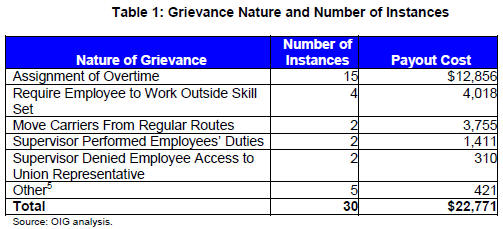This report presents the results of our self-initiated review of grievance payout costs in the South Florida District (Project Number 13YG036HR000). Our objective was to determine the cause of high grievance payout costs in this district. See Appendix A for additional information about this review.
The U.S. Postal Service has about 490,000 career employees, most of whom are covered by collective bargaining agreements with the four major postal unions. The National Labor Relations Act gives employees and the unions the right to file grievances, which are disputes between the Postal Service and employees or unions over interpretation or application of, or compliance with, union agreements. The grievance-arbitration process provides a mechanism for resolving disagreements between management and employees or unions over wages, hours, and employment conditions. A grievance payout cost is payment to an employee that is part of a grievance settlement.
Postal Service grievance payout costs decreased from $179 million in fiscal year (FY) 2009 to $87 million in FY 2012 but increased to almost $106 million in FY 2013. The South Florida District had the highest grievance payout costs of all 67 districts in FY 2013. Total costs were more than $7.6 million. Our Human Resources risk model1 revealed the South Florida District consistently ranked among the 10 districts with the highest grievance costs.
Conclusion
We reviewed 30 randomly selected FY 2013 grievance payout costs2 totaling $22,771 from the South Florida District and found that supervisors violated Postal Service collective bargaining agreement provisions primarily to address overtime and staffing issues. We found 15 of 30 grievance payouts reviewed related to overtime issues, and overtime-related grievances represented 54 percent of all grievances in FY 2013. Specifically, supervisors did not appropriately assign overtime, required employees to work outside their skill sets, moved carriers from their regular routes, performed employees’ duties, denied access to union representatives, and took other violative actions to address overtime and staffing issues.
 The South Florida District monitors overtime grievances as part of the Delivering Results, Innovation, Value and Efficiency (DRIVE) Initiative 7, Resolve Disputes.
The South Florida District monitors overtime grievances as part of the Delivering Results, Innovation, Value and Efficiency (DRIVE) Initiative 7, Resolve Disputes.
Effectively.3 As part of this initiative, management established a nationwide goal of reducing overtime grievance payout costs by 10 percent for FY 2013. In the South Florida District, overall grievance payout costs increased 95 percent in FY 2013 compared to FY 2012, and grievance payout costs related to overtime issues increased 82 percent. District management stated that this occurred primarily because the district had a backlog of claims that contributed to high grievance payout costs, including a $900,000 grievance payout from FY 2008.
For FY 2014, management set a goal of reducing all types of grievance payout costs by 10 percent from the FY 2013 level by focusing on problematic grievance issues. In the South Florida District, payout costs for overtime-related grievances decreased 5 percent through Quarter (Q) 2 of FY 2014 compared to the same period last year and overall grievance costs decreased 33 percent for that same period.
Assignment of Overtime
We found that supervisors did not grant overtime to employees who wanted it,6 required employees to work overtime when they did not want to,7 did not distribute overtime equitably among those who desired it,8 or did not assign overtime in accordance with contract provisions
We recommended management implement accountability measures from the Central Plains District regarding grievances and grievance payout costs.

At least in my office, the new people they have hired, the regulars have to go out to help them, they will send the first one that comes back because everyone is working overtime.
They even kept one CCA even though he can’t do driving in a timely manner, so they never give him driving. If they gave him a hour piece, it would take him 2 1/2 hours on the average to finish it.
How much time and money did the OIG waste trying to justify management’s actions? It’s simple violate the contract you have to pay. The problem is clear, the post office let thousands of experienced workers leave, hired inexperienced people and then said to the career workforce, we are going to screw you that didn’t leave, we are going to treat you like crap to try and get you to quit. In the offices I work at, they move career employees like they have no bid job. I personally have filed 32 grievances since February 2013 and each one has been won because they violated the contract. The post office saved billions with early outs, carrier, rural carrier and mail handler assistants and postal supporters. All those billions are now being spent on grievance violations because for every 50 people that retired, they hired one person and then expect the remaining people to do the work. IT AINT HAPPENING, I do not get paid for doing two, three, four peoples work and it shouldn’t be expected. When I asked my supervisor, what if your boss told you to go and do a custodians job what would he do? He said he’d say i don’t know how? Well neither do I and don’t train me to do it either, I have a bid job and if you don’t want to respect that, I want to see my steward and cost the post office some more money.
I would like to see a story about the millions of dollars the P.O. wastes trying to contract out work, then loses through law suites or arbitration. Offering that money as early out incentives at $20K per person, every $1 million would allow 50 people to retire early.
Here’s the reason that I believe management violates the contract. If they can get away with falsifying their numbers they scored browny points from the source of our problems, upper management. Later these stupervisors meet with the unions (spend more revenue), settle with a payout and run the same vicious cycle over and over. So the real problem is at the top (Potter) and the blame game goes down hill like…you know. When we can get human rights involved in the post office, everything else will fall into play. You treat people like children, they behave like children. You treat the workers with humiliation your no longer running a business, your too busy constantly cleaning a mess you created.
We had one of them transfer to us. Pulled the same crap, screamed in your face like a Drill Sargent. When they were called out on the violation. Weak union wouldn’t help,rather protect the supervisor because of color of skin.
If the violations aren’t reduced, then the grievance pay-outs won’t reduce either. Why isn’t the FLA district cracking down on the EAS for these frivolous infractions? The union knows that they are going to win these grievances when EAS is circumventing the contract!
We found that supervisors did not grant overtime to employees who wanted it? Really? Since when is overtime a guaranteed contractual right? Is that the way it works in Florida? I want OT so I can pay for my overextended life style and if you don’t give it to me I’ll file a grievance!
Of course, those in mgmt responsible for this complete, unnecessary, avoidable waste of $ will not be held accountable for anything.
Why is there so much effort and expense on creating fictitious numbers in order to micro manage over several decades? Yet to date the practice to shoot first and ask questions later continue to this day by all higher level positions. Don’t pee on my leg and tell me that its raining again. I’ll let you know if I’m retaliated for speaking aloud the truth again.
Notice that the goal is to reduce pay-outs. The was no mention of reducing violations.